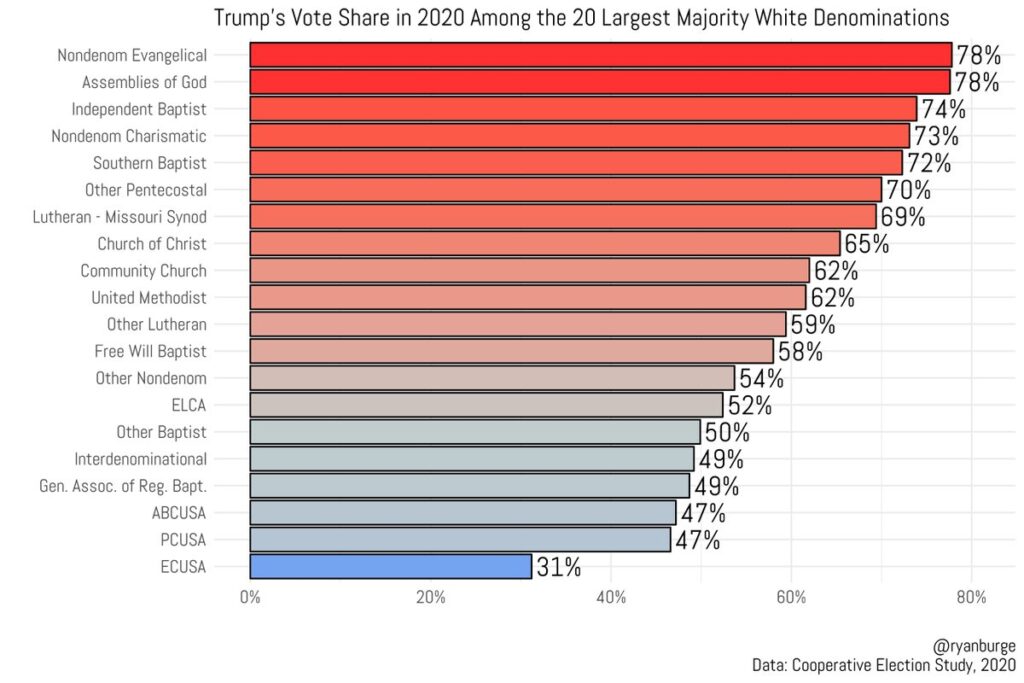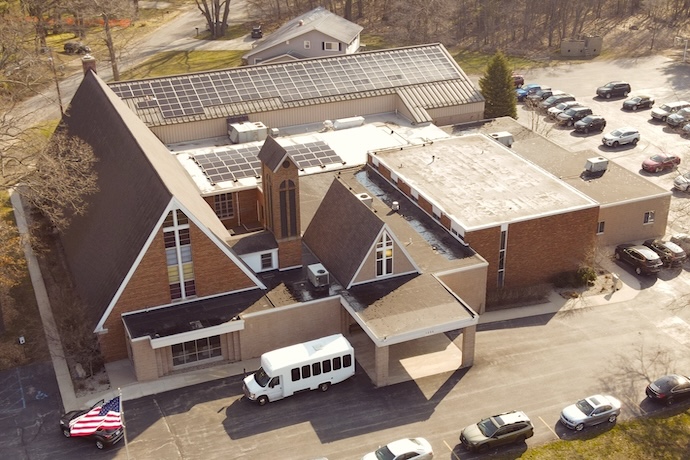Almost as soon as presumptive Democratic presidential nominee Kamala Harris announced Minnesota Governor Tim Walz as her running mate, attacks focused on his association with the Evangelical Lutheran Church in America (ELCA) started to roll in. Harris herself is a Baptist.
Christianity Today played things safe, noting that Walz had upset conservative Christian leaders during his time in office in Minnesota and carefully explaining the difference between the ELCA and the Lutheran Church Missouri Synod, the United States’s next largest (and far more conservative) Lutheran body.
The Christian Post took things further, declaring the ELCA “notoriously progressive” for, among other sins, endorsing Black Lives Matter policy proposals and implying on social media that churches might allow people to write their pronouns on their name tags.
Mollie Hemingway, Editor-in-Chief of The Federalist, a right-wing publication with a history of promoting false information about the 2020 election, Covid-19, and climate change, showed no such restraint, proclaiming on Twitter:
As a confessional Lutheran, I’m getting a lot of questions about Tim Walz possibly being Lutheran. FWIW, Walz is ELCA, an extremely left-wing sub-denomination. You may be familiar with the ELCA due to some of their congregations using the “sparkle creed” or hosting drag shows.
Others were even more over the top. The self-described “polemical news site” Protestia declared: “Tim Walz’s Lutheran Church is a Trainwreck of Heresy and Blasphemy.” In this case, the focus was on Pilgrim Lutheran Church in St. Paul—the congregation that Walz sometimes refers to as his “parish.”
These attacks reflect a conservative pattern of delegitimizing opponents, both political and religious. Barack Obama famously faced intense scrutiny over his association with the firebrand preacher Jeremiah Wright at Trinity United Church of Christ in Chicago. Obama was painted as “not a real Christian” whose pastor substituted Black power for the gospel. In Walz’s case, it’s more like being insufficiently Christian, hence Hemingway sniffing about the ELCA being a “sub-denomination.”
And while many of the attacks on Obama’s faith were motivated by naked partisanship (and not a small amount of racism), I’m not sure Walz’s detractors can help themselves. In a now-deleted post, one Twitter user argued:
Walz isn’t actually Lutheran, either: his church does not confess the unaltered Confession of Augsburg to be true, and so they are not actually Lutheran, but just a stack of Methodists in a trenchcoat.
That user, like Hemingway, appears to be a member of the Missouri Synod, which like the even more conservative Wisconsin Evangelical Lutheran Synod (WELS) and smaller bodies, defines itself in large part in opposition to ecumenism. Which is to say, not playing well with others is their identity. So at least some of the flak over Walz’s ELCA membership stems from the fine Lutheran tradition of splitting and reforming.
Scholars of church history can weigh in on the question of whether the ELCA is theologically “extremely left-wing,” but as a matter of politics and sociology, such a claim is, according to religious demographer Ryan Burge: “demonstrably, empirically false.” By his analysis [see graph below], 52% of ELCA members voted for Donald Trump in 2020. That’s in line with the 52-47 split in Trump’s favor among mainline Protestants overall, and only somewhat lower than the net 56% approval rating mainliners gave Trump in June of 2020.

One might want to be fair to the ELCA’s detractors by noting that White evangelical Protestants turned out in far higher numbers for the former president. So perhaps the matter of ELCA support for Trump is simply a matter of perspective. On the other hand, the ELCA vote for Trump was substantially higher than that of Muslims, Jews, or the religiously unaffiliated.
Likewise, 32% of ELCA members describe themselves as “conservative,” which is 20 percentage points lower than among Missouri Synod Lutherans. But it’s middle of the road for mainline churches as a whole—neither as high as Methodists nor as low as members of the United Church of Christ*—a pattern that also extends to party affiliation and social issues like same-sex marriage and abortion.
So is the ELCA more liberal than White evangelical bodies like the Missouri Synod or the WELS? Hey, you betcha, as they say in Minnesota. But “extremely left-wing”? Not really.
In fact, the ELCA, like mainline Protestants overall, tends to be right around the average views for all Americans, or just slightly more progressive. And when it comes to views on racial discrimination and immigration, White mainline Protestants tend to be closer to their counterparts in White evangelical churches than to Black Protestants or Unitarian Universalists. In other words, when it comes to White ELCA members, their denomination may be less predictive than their Whiteness.
After saying all that, you might be surprised to hear that this is not intended as a defense of Tim Walz or even his faith, but rather to suggest that, as always, things are complicated—especially in the world of religion. Individual ELCA congregations might be more progressive than the norm, like Pilgrim Lutheran. There is however a substantial likelihood that more than a few ELCA members who disagreed with Trump on race, abortion, and immigration voted for him nevertheless.
Sparkle creeds and Methodists in trench coats make easy targets, but critics would be better off looking at race, education, and residence to find the sources of Lutheran progressivism (or conservatism). The ELCA itself, as always, just isn’t that exciting.
*The most conservative segment of mainline Protestantism is actually the Anglican Church in North America and similar bodies. I leave them out of this analysis because of their size, and because I suspect that they will soon be reclassified as evangelicals, much like the conservative Lutheran denominations.





